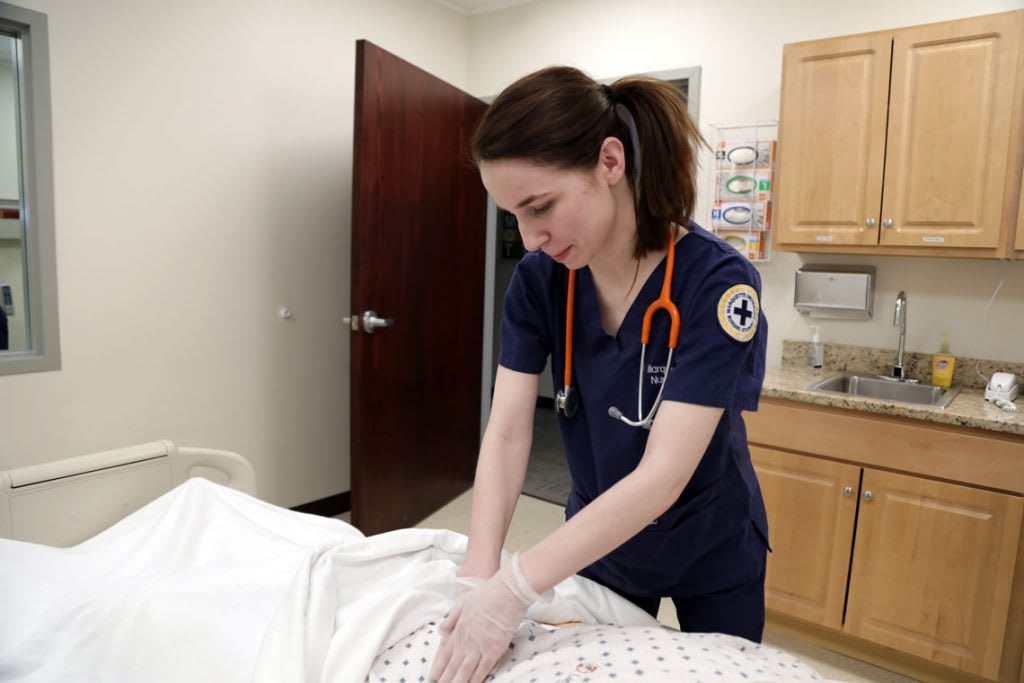How to Become a Nurse with a Biology Degree in 6 Steps
Each blog post is dated and contains accurate information as of that date. Certain information may have changed since the blog post publication date. If you would like to confirm the current accuracy of blog information, please visit our Direct Entry MSN overview page or contact admissions at (866) 891-8438.
If you wonder how to become a nurse with a biology degree, you can achieve this career through deciding on a degree type, confirming your eligibility, enrolling within a nursing program, and passing the NCLEX-RN examination. A nursing career could be within reach with your previous degree.

Can you become a nurse with a biology degree? If you have previously earned a degree in biology, you can apply that biology degree toward studying for and entering a nursing career. In fact, this previous degree experience can help position you to have a smoother nursing school experience and potentially become a nurse more quickly than some other students. Your knowledge of the sciences from your previous biology degree, including chemistry, anatomy and genetics, provides a fundamental base for your nursing curriculum that makes it easier to adjust.
With the knowledge you have already gained, you can confidently pursue a nursing degree and even attain a Master of Science in Nursing degree through a degree path like Marquette University’s Direct Entry MSN program. Read on to discover the six steps you can take to a new career and learn how to become a nurse with a biology degree.
1: Decide Which Nursing Degree You Want
Before you take any steps toward applying your biology degree to nursing, your first step should be to decide which type of nursing degree best aligns with your nursing career goals. For many, a Bachelor of Science in Nursing (BSN) degree can be a good option that builds on your biology degree and qualifies you to become an entry-level nurse. For others who are intent on advancing in their careers or pursuing nursing leadership roles, a Master of Science in Nursing (MSN) degree may be worth the additional effort.

Timelines are an important element to consider when choosing a degree. Many “traditional” MSN or BSN programs are administered over four years or longer. If this is too long to suit your goals, you should consider an accelerated program. Programs like Marquette’s Direct Entry MSN leverage your previous bachelor’s degree into an accelerated nursing curriculum that can be completed in five semesters (or eight semesters for students who enroll in our extended option format) and offer a more rapid path into your desired nursing career.
Additionally, MSN-educated nurses can access additional career path options. A MSN degree can help to meet qualifications for certain advanced practice nursing roles, like nurse practitioner or certified nurse midwife. And in a healthcare industry increasingly moving toward a professionalized nursing workforce, a master’s-level degree can help to differentiate you as a candidate for nursing leadership roles.

See some of the many benefits an MSN can offer for nursing career advancement.
2: Confirm Your Eligibility for Nursing School
Once you have narrowed down what you are looking for out of your nursing education, the next step before enrolling is to confirm your eligibility. Admissions requirements like those upheld by Marquette are intended to ensure students are fully qualified to undertake a strenuous course of study on an accelerated timeline. Your first step in going from a bio major to nursing should be to speak with an admissions adviser, as they will be able to examine your transcript and any other relevant factors, share whether you are eligible and advise you on which prerequisites you may still need to take.
The courses you’ve already taken through your previous biology degree can be used toward a nursing degree through Marquette University’s Direct Entry MSN program. Prospective students are required to complete a number of prerequisites, but the courses you have already taken to earn your biology degree can count toward completion of your prerequisites. One of the advantages of transitioning from a biology degree to nursing is that you can start your nursing school journey sooner.
3: Enroll in a Nursing Program

Once you have completed all your prerequisite courses and confirmed with your admissions adviser that you meet all admissions requirements, the next step involves submitting your application and (hopefully) receiving acceptance into nursing school. At Marquette, for instance, we offer program start dates in Spring, Summer and Fall. This means that once you apply, if you are accepted, a start date will always be right around the corner.
Be advised that, due to the need to complete labs and clinicals in person, any nursing program you enroll in will require you to live within commuting distance. If this means you are willing to relocate, now is also the time to make living arrangements for the time frame you are planning on relocating within.
Want more detail on how to get into nursing school? See 5 steps for successful enrollment.

4: Study Toward Your MSN Degree
If you have been accepted into a nursing program, now is when the real work toward applying your B.S. in biology to nursing begins. With starts in January, May and August, Marquette’s Direct Entry MSN program in Wisconsin condenses your nursing education into an accelerated five or eight-semester timeframe (depending on program modality) by leveraging your previous biology degree.
The program is challenging and fast-paced. Students who excel in the Direct Entry MSN program are devoted, self-motivated and hungry to learn. They know how to handle their stress and aren’t afraid to ask questions and work collaboratively with fellow classmates. The program, centered around our program site locations, will be administered with a three-pronged approach combining coursework, labs and clinical rotations.
5: Pass The NCLEX-RN® Exam
Once you graduate with your degree, you’re almost ready to start a new position as a practicing nurse, but you’ll need to complete one more thing: earning your nursing license. The only way you’ll be able to achieve that is through successfully completing the National Council Licensure Exam (NCLEX-RN®). This test is meant to ensure each student’s nursing knowledge, and each nursing curriculum is built to give students the knowledge they need to pass the exam.

6: Secure a Nursing Position
Once you achieve an MSN degree, there are countless career opportunities available for you. While your MSN degree through Marquette’s Direct Entry MSN program is an advanced degree, you will still enter the healthcare field as an entry-level nurse. But, having this degree gives you a leg up over BSN degree-holders to continue your education and earn your certification in the specialty you desire. Whether you are interested in becoming a primary care nurse practitioner, nurse midwife, nurse educator, nurse administrator or beyond, your MSN degree offers the ideal path to both become a nurse and continue to advance your career.
Take the Next Step Toward a Nursing Career
Now that you know how to become a nurse with a biology degree, you have the knowledge it takes to pursue this new career and enter a new chapter in your life while answering the calling to help others. Contact an admissions adviser to start the conversation on an accelerated nursing program for biology majors, and begin the journey toward a new future in nursing today.
